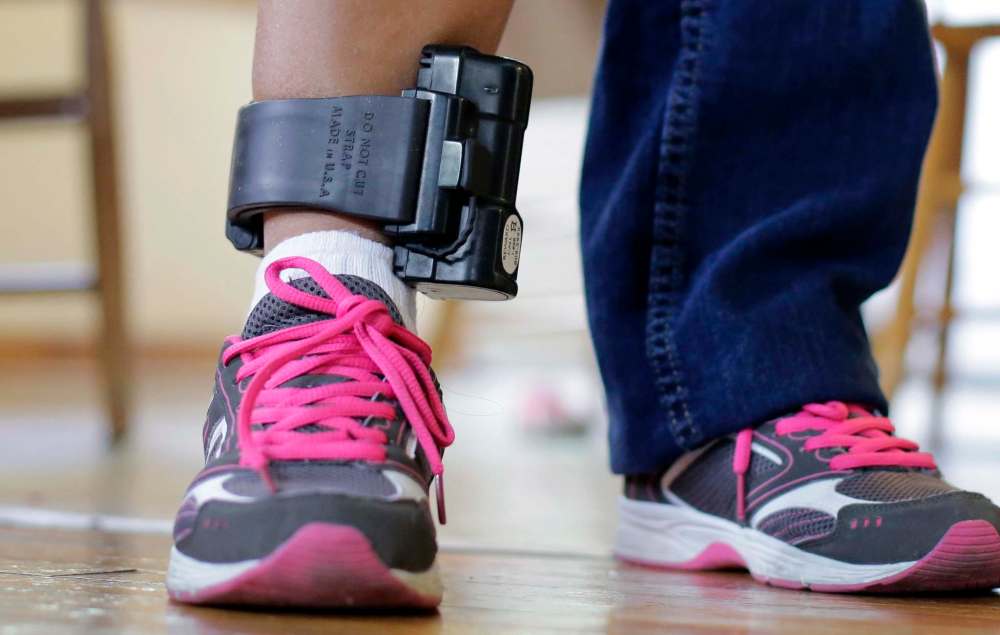Ankle bracelets for criminals scrapped, called ineffective
Advertisement
Read this article for free:
or
Already have an account? Log in here »
To continue reading, please subscribe:
Monthly Digital Subscription
$1 per week for 24 weeks*
- Enjoy unlimited reading on winnipegfreepress.com
- Read the E-Edition, our digital replica newspaper
- Access News Break, our award-winning app
- Play interactive puzzles
*Billed as $4.00 plus GST every four weeks. After 24 weeks, price increases to the regular rate of $19.95 plus GST every four weeks. Offer available to new and qualified returning subscribers only. Cancel any time.
Monthly Digital Subscription
$4.99/week*
- Enjoy unlimited reading on winnipegfreepress.com
- Read the E-Edition, our digital replica newspaper
- Access News Break, our award-winning app
- Play interactive puzzles
*Billed as $19.95 plus GST every four weeks. Cancel any time.
To continue reading, please subscribe:
Add Free Press access to your Brandon Sun subscription for only an additional
$1 for the first 4 weeks*
*Your next subscription payment will increase by $1.00 and you will be charged $16.99 plus GST for four weeks. After four weeks, your payment will increase to $23.99 plus GST every four weeks.
Read unlimited articles for free today:
or
Already have an account? Log in here »
Hey there, time traveller!
This article was published 29/09/2017 (3030 days ago), so information in it may no longer be current.
Ankle bracelets work wonders to keep convicted criminals under surveillance on police TV shows, University of Manitoba law Prof. Karen Busby said Friday — in real life, not so well.
“There are a million problems with electronic monitoring,” said Busby, an expert on violence against women who was on a government advisory committee on the topic.
Justice Minister Heather Stefanson told reporters Friday she’s phasing out the last seven ankle bracelets in use in Manitoba because the system is inaccurate and ineffective. The provincial minister said she was acting on that committee’s report to the former NDP government.

“This particular device was not enhancing public safety in Manitoba,” Stefanson said.
Busby said the ankle bracelets can be taken off, tampered with, the battery needs to be recharged every 24 hours, the person being monitored can go out of cellphone range and someone has to be monitoring the system around the clock.
But the worst problem, she said: “It’s not an effective emergency alert.”
“This is not an effective tool, to say to a woman, ‘If he comes to your house, we’ll be there,’” Busby said. “He’s already there.
“It gives you a really false sense of security. They don’t work the way they do on police shows.”
Busby said even if someone is monitoring and sees the person wearing the ankle bracelet has gone to a house where an ex-partner lives, and then dispatches police, “It can’t be fast enough to get there in time, if that’s what you think it does.”
Nor is violence against women limited to the woman’s home, Busby said. An ankle bracelet won’t tell police the person wearing it is approaching a victim elsewhere in an area where they are not forbidden to go.
The ankle bracelets are used primarily for domestic assault cases and to track convicted car thieves.
Regardless of the crime, the person wearing it needs to plug the bracelet into a charger while watching TV or sleeping, she said. “If you forget to charge it, do the police come to your house? That’s a lot of police calls.
“You need to have someone monitoring, sitting in front of a computer — that’s pretty expensive,” Busby said. “They’re apparently not that hard to remove. It will tell you where the bracelet is, not where the person is.”
Stefanson said there are currently four men convicted of domestic violence and three car thieves wearing ankle bracelets among the 8,300 people on probation in Manitoba.
“We will always put public safety first,” the justice minister said.
In half the cases in which ankle bracelets were worn, the person tampered with them or cut them off, Stefanson said.
She would not answer directly when asked whether the problem was with the specific product bought by the NDP, or with all ankle bracelets on the market.
The province will save about $100,000 per year by dropping the ankle bracelets, Stefanson said.
The NDP said it was “going to pass on this one,” without elaborating why it would not comment on the issue.
“The province is doing the smart thing,” said University of Winnipeg criminal justice Prof. Michael Weinrath, director of the Justice Research Institute. “I’ve never been a huge fan of electronic monitoring.”
They’re popular for politicians who want to be seen to be doing something about reducing crime, he said. “It’s sexy, it’s technology, it applies space-age gadgets.”
But studies show it doesn’t reduce recidivism, Weinrath said.
“It’s really more expensive to use than you think,” he said, and requires 24-hour-a-day monitoring, usually by a private company. The more offenders being monitored, the more people to watch them go about their daily business and try to keep track of someone suddenly acting suspiciously, he said.
“The police aren’t going to rush to your home when you rip it off — you’ll be long gone.”
nick.martin@freepress.mb.ca

Nick Martin
Former Free Press reporter Nick Martin, who wrote the monthly suspense column in the books section and was prolific in his standalone reviews of mystery/thriller novels, died Oct. 15 at age 77 while on holiday in Edinburgh, Scotland.
Our newsroom depends on a growing audience of readers to power our journalism. If you are not a paid reader, please consider becoming a subscriber.
Our newsroom depends on its audience of readers to power our journalism. Thank you for your support.
History
Updated on Saturday, September 30, 2017 11:10 AM CDT: Edited

